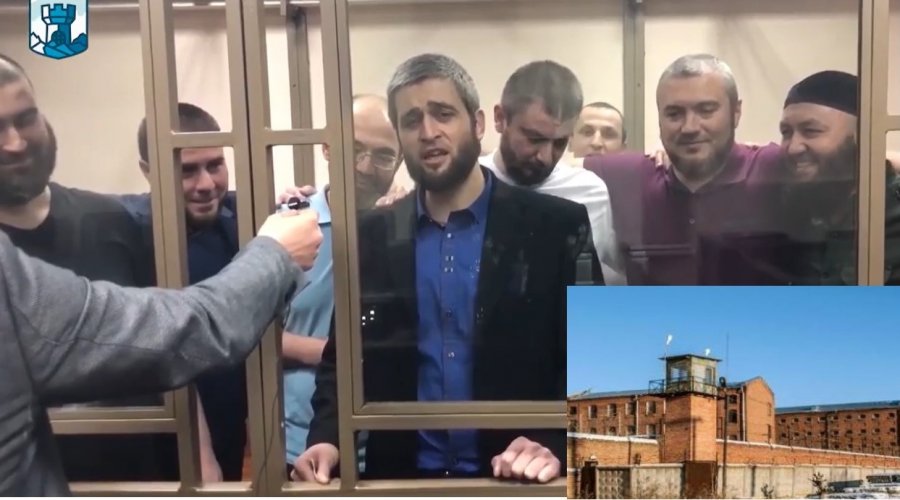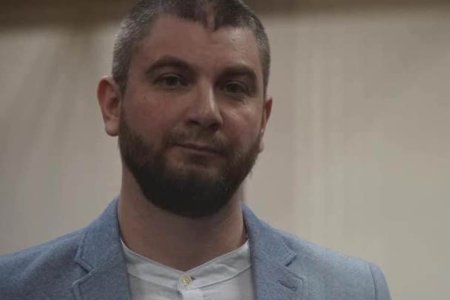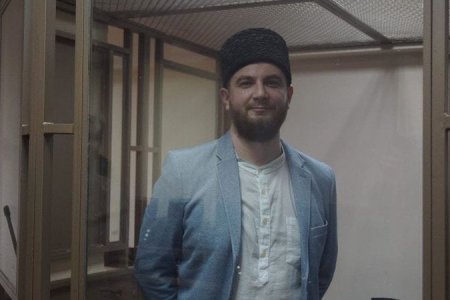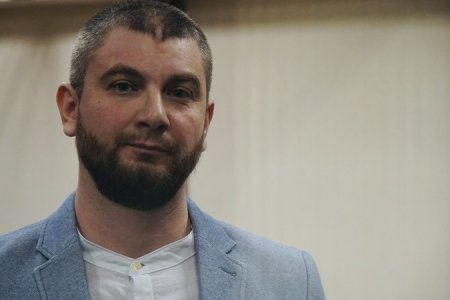
A Russian occupation ‘court’ has refused to move Marlen Asanov closer to his family in Crimea, although Russia’s imprisonment of the Crimean Tatar civic journalist and recognized political prisoner 1700 kilometres from his home is even in breach of Russian practice. Or it was until 2014 when Russia’s mounting repression, first in Crimea, then on all occupied Ukrainian territory, led to a huge number of Crimean Tatar and other Ukrainian political prisoners being illegally taken to Siberia or other very distant parts of the Russian Federation. It is no wonder that Crimean Tatars speak of 2014 as a new Russian deportation after Stalin’s Deportation of the entire Crimean Tatar people in 1944.
The application merely to transfer Marlen Asanov closer to his family in Crimea was heard by ‘judge’ Herman Atamaniuk from the occupation ‘Bakhchysarai district court’ on 9 August 2024. Asanov, who is serving an internationally condemned 19-year sentence without any recognizable crime explained that his imprisonment in Mordovia, 1700 kilometres from Crimea made it both difficult and prohibitively expensive for his wife and children to visit him. Atamaniuk’s total rejection of the application will be appealed against as soon as Asanov’s lawyer, Nazim Sheikhmambet, receives the full ruling.
This is not the first such application by a Crimean Tatar political prisoner, and the outcome cannot be called surprising. That does not, however, make it any the less brutal and lawless. Russia is now using its effective expulsion from the Council of Europe and withdrawal from the European Convention to claim that European Court of Human Rights judgements are not binding. They are, however, if passed while Russia was a member, and in May 2017 (in the Case of Polyakova and others vs. Russia), ECHR found that imprisoning people thousands of kilometres away from their families is a violation of their right to family ties. Virtually all of the Crimean Tatar, and most other Ukrainian political prisoners are held vast distances from Crimea. In fact, such imprisonment so far from a person’s home is also in violation of Rule 17.1 of the European Prison Rules, as well as of the Universal Declaration of Human Rights to which, at least on paper, Russia remains a party.
It is also gratuitously cruel and makes it clear that Russia is targeting not only Crimean Tatar civic activists and journalists, but also their entire families. While passing horrific sentences on supposed ‘terrorism’ charges, Russia’s FSB and other key players are in no way seeking to conceal the political nature of these ‘trials’. Marlen Asanov was even told by a Russian FSB investigator that it was his own fault that he was imprisoned. They had given him warnings to leave Crimea, the FSB man said, but he had refused to take heed.
Arrests

Asanov was arrested in Russia’s first open attack on civic journalists and activists from the vital Crimean Solidarity human rights movement. This began with armed ‘searches’ at the homes of six Crimean Tatar families in the early morning of 11 October 2017, with six men, all of whom had been active in supporting political prisoners and their families, arrested. Ernes Ametov (b. 1985); Marlen (or Suleiman) Asanov (b. 1977); Timur Ibragimov (b. 1985) and Seiran Saliyev (b. 1985) were civic journalists, while Memet Belyalov (b. 1989) and Server Zekiryaev (b. 1973) were both civic activists. While obvious then that Russia was seeking to crush an important human rights initiative, it was the arrest on 21 May 2018 of two other Crimean Tatars from Bakhchysarai - Crimean Solidarity Coordinator and civic journalist Server Mustafayev (b. 1986), as well as Edem Smailov (b. 1968)) that elicited international condemnation and awareness of escalating repression in occupied Crimea. Virtually all of the men had suffered harassment and administrative prosecution for their civic position before these arrests.
The charges
Not one of the men was accused of any actual crime, only of unproven ‘involvement’ in Hizb ut-Tahrir, a peaceful transnational Muslim organization which is legal in Ukraine and which is not known to have committed acts of terrorism anywhere in the world. There were no grounds for the 2003 Russian Supreme Court ruling which declared Hizb ut-Tahrir ‘terrorist’, and it is likely that the move was aimed at enabling Russia to extradite victims of religious persecution back to Uzbekistan.
Marlen Asanov; Memet Belyalov and Timur Ibragimov were charged with ‘organizing’ a Hizb ut-Tahrir group Article 205.5 § 1 of Russia’s criminal code, while Ernes Ametov; Server Mustafayev; Seiran Saliyev and Edem Smailov were accused only of ‘involvement’ in such an alleged group (Article 205.5 § 2), The distinction is largely arbitrary, however it makes a difference to the length of the sentence, and there have been occasions where the charge was changed to the more serious of the two in reprisal, for example, for refusing to remain silent about torture.
All eight men were also charged (under Article 278) with ‘planning to violently seize power’. This new charge also appeared only in February 2019, with no attempt ever made to explain how the men were planning such a ‘violent seizure’.
The ’evidence’
There were three illicitly taped and entirely innocuous conversations in a Crimean Mosque which the FSB sent to three supposed ‘experts’. Yulia Fomina; Yelena Khazimulina, and Timur Zakhirovich Urazumetov are all notorious for lacking any professional competence to back assessments which invariably support whatever claims the prosecution makes.
Russia’s use of anonymous and totally secret ‘witnesses’ has been found in violation of the right to a fair trial by the European Court of Human Rights and has been condemned by the UN Secretary General. The prosecution and judges are complicit in this travesty, with the judges regularly blocking questions which show that the alleged ‘witness’ can only recite claims from the indictment and may not even know the defendants.
In this case, both ‘secret witnesses’ were, in fact, recognized, and their reasons for collaborating with the FSB entirely clear to the court. Konstantin Tumarevich is a Latvian citizen and fugitive from justice who could not risk being sent back to Latvia after his passport expired. He is believed to have been used by the FSB in several prosecutions. Narzulayev Salakhutdin was also living in occupied Crimea without the proper documents and did not want to be forcibly returned to his native Uzbekistan.
Convictions, ‘acquittal’ and re-trial
On 18 September 2020, Rizvan Zubairov, together with Roman Saprunov; and Maxim Nikitin from the Southern District Military Court in Rostov (Russia) convicted seven of the men, and acquitted Ametov. The sentences, all in the harshest of Russian penitentiary institutions, were horrific: Marlen Asanov was sentenced to 19 years; Memet Belyalov - 18 years; Timur Ibragimov – 17 years; Server Mustafayev - 14 years; Seiran Saliyev - 15 years (reduced at appeal to 14 years); Edem Smailov - 13 years and Server Zekiryaev – 13 years.
On 8 July 2022, two other Crimean Tatar civic activists - Oleh (Ali) Fedorov (b. 1970) and Ernest Ibragimov (b. 1981) were sentenced to 13 years in a ‘trial’ based on the same illicitly taped conversations, dodgy ‘expert’ assessments and ‘secret witnesses’ (details here).
‘Appeal’ and rearrest
Appeals were, of course, lodged against the seven horrific sentences. It was only really on 14 March 2022 during the final hearing that it became clear that the prosecutor, Yevgeny Sergeevich Kolpikov had lodged an appeal against Ernes Ametov’s acquittal.
There was every reason to throw out all of the convictions. Instead, the only change made was that Ernes Ametov’s acquittal was revoked. Ametov had been placed under huge pressure to give false testimony against other Crimean Tatars and had refused, despite understanding the reprisals he would face. He was shortly afterwards rearrested and put on ‘trial’ at the same Southern District Military Court. On 26 December 2022, Yevgeny Kolpikov, who, in 2020 had demanded a 17.5 year sentence against Ametov, asked the court to sentence him to 18.5 years. Three days later, on 29 December 2022, the new panel of ‘judges’ – Aleksei Abdulmazitovich Magomadov (presiding); Kirill Nikolaevich Krivtsov; and Vladimir Yevgenievich Tsybulnik – passed a new sentence, of 11 years.
Marlen Asanov has spent almost seven years in Russian captivity and, if Russia is allowed to continue such repression, is due to spend another 12 years. He is by profession a Crimean Tatar Language and Literature, however in 2002 he created Caravansary ‘Salachik’ [Караван-сарай «Салачик»], which was a café and a Crimean Tatar cultural-ethnographic centre made up of a complex of architectural structures intended for the accommodation and relaxation of travellers (caravaners) and guests. Asanov had also allowed the centre to be used for the monthly meetings of Crimean Solidarity.
He was also very active in public life and, even before Russia’s annexation, was known for his philanthropy. As repression escalated under Russian occupation, he played an active role in helping the families of political prisoners. For this he was named Ukraine’s Volunteer of the Year in 2017, and targeted for particularly ferocious persecution by Russia’s FSB.
He and his wife Ayshe have four children – three sons (Said, Seitmamut and Eskender) and the youngest, a daughter, Safiye. Said had hoped to become an architect before his childhood was brutally shattered on 11 October 2017. Now he wants to be a lawyer, to help other victims of injustice.
Please help ensure that Marlen Asanov and the other political prisoners are not forgotten! Russia has made it impossible to live in occupied parts of Ukraine without taking Russian citizenship and then uses such citizenship as excuse for blocking exchanges of prisoners. The men are Ukrainian nationals who need our support, and our voices.
You can also write letters! They are a lifeline to the men and send an important message to Moscow that its treatment of Ukrainian political prisoners is under scrutiny. Letters need to be in Russian, handwritten, and on ‘safe’ subjects. If that is a problem, use the sample letter below (copying it by hand), perhaps adding a picture or photo. Do add a return address so that the men can answer.
Example letter
Привет,
Желаю Вам крепкого здоровья и надеюсь, Вы скоро вернетесь домой, к своим родным. Простите, что мало пишу – мне трудно писать по-русски, но мы все о Вас помним.
[Hi. I wish you good health and hope that you will soon be home, with your family. I’m sorry that this letter is short – it’s hard for me to write in Russian., but you are not forgotten. ]
Marlen Asanov
431120, Россия, ФКУ ИК-7 УФСИН России по Республике Мордовия, Зубово-Полянский район, п. Сосновка, ул. Центральная, д. 2.,
Асанову, Марлену Рифатовичу, 1977 г. р
[In English: 431120 Russian Federation, Mordovia, Prison Colony No. 7, Zubovo-Polyansky raion, Sosnovka, No. 2 Tsentralnya St.
Asanov, Marlen Rifatovich, b. 1977 ]
Memet Belyalov
175130 Россия, Новгородская обл., рп. Парфино, ФКУ ИК-9, ул. Народная, зд. 9.,
Белялову, Мемету Решатовичу, 1989 г.р.
[In English: 175130 Russian Federation, Novgorod oblast, Parfino, Prison Colony No. 9, Narodnaya St., bld 9
Belyalov, Memet Reshatovich, b. 1989 ]
Timur Ibragimov
391825, Россия, ФКУ ИК-5, Рязанская область, Скопинский район, с. Клекотки
Ибрагимову, Тимуру Изетовичу, 1985 г.р.
[In English: 391825 Russian Federation, Ryazan oblast, Klekotki, Prison Colony No. 5
Ibragimov, Timur Izetovich, b. 1985 ]
Server Mustafayev
392000, Россия, Тамбов, ул. Мичуринская, д. 57, ФКУ ИК-1
Мустафаеву, Серверу Рустемовичу, 1986 г.р.
[In English: 392000 Russian Federation, Tambov, Michurinskaya St., 57, Prison Colony No. 1
Mustafayev, Server Rustemovich, b. 1986 ]
Seiran Saliyev
301470, Россия, Тульская обл., Плавск, пос Белая Гора, ФКУ ИК-4
Салиеву, Сейрану Алимовичу, 1985 г.р.
[In English: 301470, Russian Federation, Tula oblast, Plavsk, Belaya Gora, Prison Colony No. 4
Saliyev, Seiran Alimovich, b. 1985 ]
Edem Smailov
156522, Россия, Костромская обл., Костромской район, пос. Бычиха-12, ФКУ ИК-7
Смаилову, Эдему Назимовичу, 1968 г.р.
[In English: 156522, Russian Federation, Kostroma oblast, Bychykha-12, Prison Colony No. 7
Smailov, Edem Nazimovich, b. 1968 ]
Server Zekiryaev
301781, Россия, Тульская область, г. Донской, мкр. Комсомольский, пр-д Димитрова, 1, ФКУ ИК-1, ,
Зекирьяеву, Серверу Зекиевичу, 1973 г.р.
[In English: 301781 Russian Federation, Tula oblast, Donskoy, Komsomolsky, pr-d Dimitrova 1, Prison Colony No. 1
Zekiryaev, Server Zekievich, b. 1973 ]
The addresses for Ernes Ametov, Oleg Fedorov and Ernest Ibragimov are not yet known (as they were held in Rostov until the end of their appeal )



